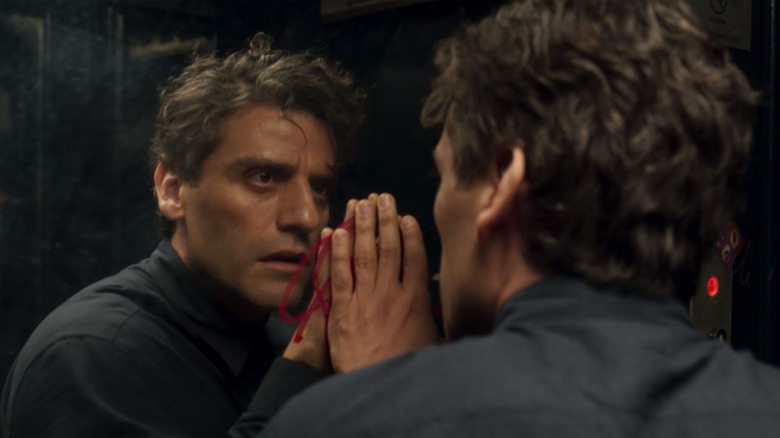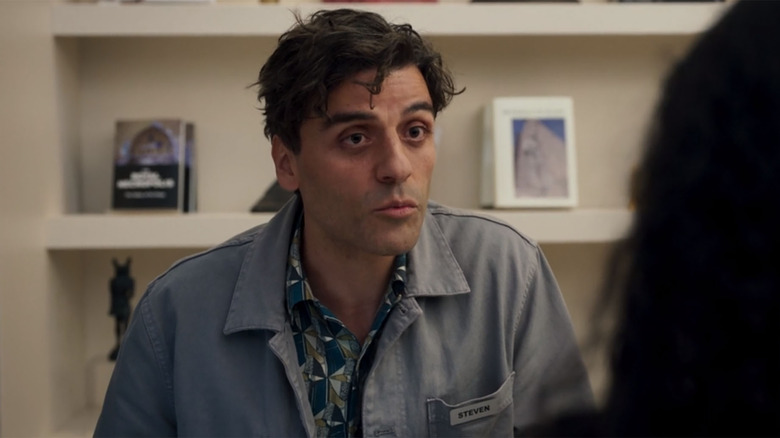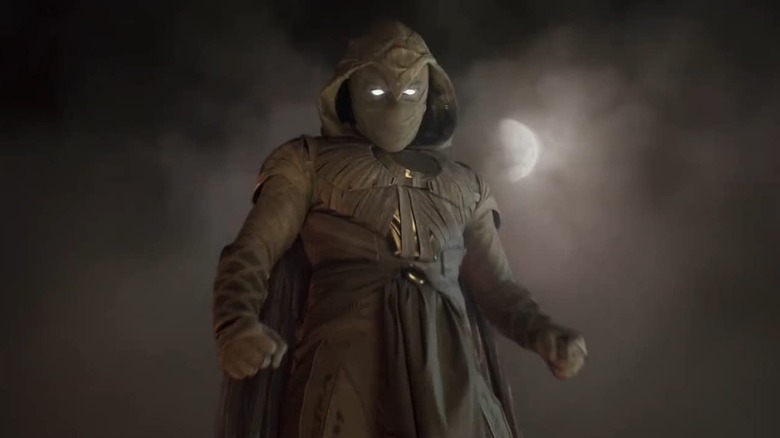Moon Knight's Depiction Of Dissociation Made Me Feel Seen
The following article includes references to trauma, mental illness, and dissociation. And also spoilers for the first episode of "Moon Knight."
Superhero comics have plenty of allegories for mental illness in their pages, but rarely do they tackle it as head-on as "Moon Knight," in which the title character is a man with Dissociative Identity Disorder (DID). The new Disney+ series based on the comics stars Oscar Isaac as Steven Grant, Marc Spector, and Moon Knight — three minds all inhabiting the same body. The first episode opens with Steven not yet aware that his habit for sleepwalking is actually Marc taking over, though he begins to piece it together based on his interactions with people who have met him as Marc. He spends most of "The Goldfish Problem" just trying to make sense of what's happening and what the other version of himself has done, and it's painfully and hilariously relatable to anyone who has ever "come to their senses" after a mental health episode and realizes they have a lot of cleaning up and apologizing to do.
Mental illness is often stigmatized in media, pushing villains to do evil deeds or leading heroes to a tragic downfall. It can get a little depressing, honestly, and watching a Marvel superhero deal with his dissociation was incredibly empowering. Instead of feeling laughed at, ostracized, or feared, I felt understood.
Reconciling another identity
There are few experiences in this world as thoroughly unsettling as dissociating. According to the National Alliance on Mental Illness (NAMI), about 75% of people will experience it at least once in their lifetime. Dissociation usually happens as a defense mechanism, in which the brain cuts off portions of our emotional and memory processing centers in order to protect us from some kind of trauma. That's why people often don't remember portions of traumatic events, and it can be helpful in the moment, as a means for survival. Unfortunately, some people with mental illness experience dissociation more than most. It's alienating, destabilizing, and tough to talk about because it's hard to trust yourself when you've become a truly unreliable narrator in your own life. In Steven's case, his DID complicates things because he has distinct identities that take over during his dissociative episodes, like Marc.
One of the symptoms of my Complex Post-Traumatic Stress Disorder (C-PTSD) is dissociation with depersonalization, which means that sometimes my dissociation "switch" goes off to try and protect me from impending trauma when there is no real danger. Often our brains go into "fight or flight" mode, ramping up adrenaline in order to help us survive. I don't wake up in fields with a busted jaw like poor Steven, but I know what it's like to feel control over yourself again and be confused and terrified because you've realized that you weren't in control for a bit. It wasn't any kind of choice and the control wasn't "lost," your identity just took a vacation for a bit because brains are weird little organs just doing their best. Now, not only do you have to process whatever you're going through, but you have to play detective and try to fix whatever your dissociated self might have wrecked. Thankfully in my case, it's usually something small like cleaning up something I threw on the floor to create a "distraction" or just apologizing for saying something weird and then running and hiding. But it's still surreal and isolating to clean up after and apologize for events that are a haze at best.
You are not alone
In the first episode, Steven realizes that he has a date with one of his co-workers at the museum, but he has no recollection of asking her out. It was something that Marc did, and watching Steven's confusion as he tried to save face was oddly comforting. Learning to roll with the punches is vital if you're going to survive having any kind of dissociation, after all. The supernatural elements make his mental illness feel more real instead of like a gimmick; I've never actually had a conversation with my "other self," but I have imagined it plenty of times. "Moon Knight" helps re-contextualize mental illness. Instead of only being a curse or a burden to be borne, it helps Steven and Marc survive, and eventually become a superhero.
My C-PTSD may not give me awesome moon powers (call me, Khonshu), but it has helped shape who I am and gives me unique perspectives that I can use to help others. Would I rather not have it at all and live a "normal" life? Of course, but we play the hands we're dealt, and being able to see one of the more challenging aspects of my life reflected in a major television miniseries is encouraging. Representation matters, and hopefully other people who see shades of themselves in "Moon Knight" will be able to find help and treatment, or if they're already in it, they'll be reassured that they're not alone.
If you or someone you know is struggling with mental health, please contact the Crisis Text Line by texting HOME to 741741, call the National Alliance on Mental Illness helpline at 1-800-950-NAMI (6264), or visit the National Institute of Mental Health website.


